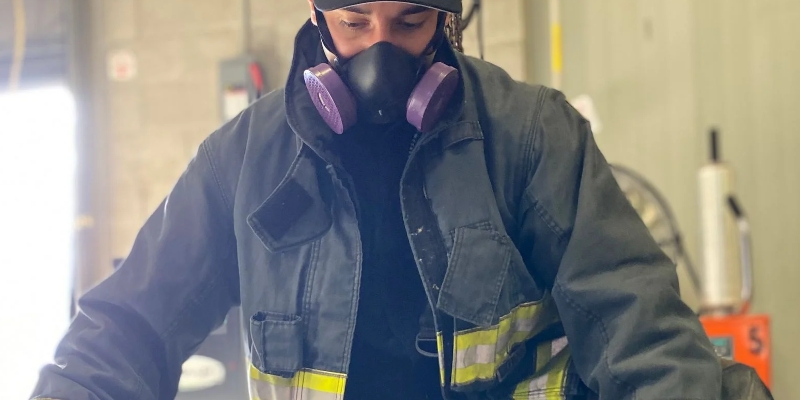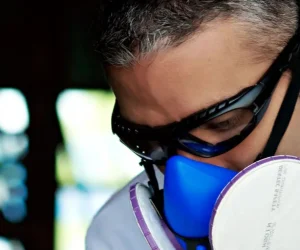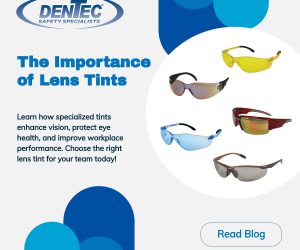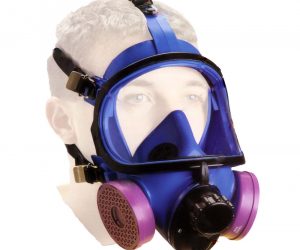When it comes to filters, we get a lot of questions, and with so many options available, it’s easy to see why. Choosing the right filter can be confusing and even overwhelming. In this post, we’re focusing on P100 filters, a popular choice due to their high-efficiency level of protection. However, it’s crucial to remember that selecting the right filter isn’t just about going with the most popular option; it should be based on the specific contaminants in your environment and the level of exposure you face.
We’ve compiled the top questions we receive about P100 filters to help you understand if and when they’re the right choice for you.
What is a P100 filter?
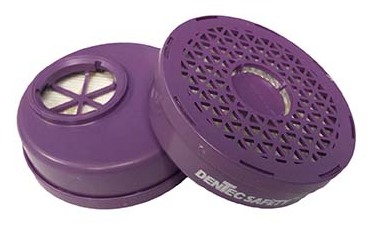
Let’s start with the basics. A P100 filter is a type of respirator filter that is certified by NIOSH (National Institute for Occupational Safety and Health) to filter out at least 99.97% of airborne particles, including both oil and non-oil aerosol-based particulates.
- Is a P100 filter a HEPA filter? Yes, a P100 filter is comparable to a HEPA filter in terms of its filtration efficiency. Both are capable of filtering out 99.97% of particulates that are 0.3 microns in size or larger.
- Are all P100 filters the same? No, not all P100 filters are the same. While they all meet the minimum filtration efficiency of 99.97%, they can vary in terms of design, comfort, and additional features such as carbon layers for odor reduction.
- What are P100 filters made of? P100 filters are typically made from a combination of non-woven materials designed to capture particles as air passes through. These materials often include electrostatically charged fibers to enhance particle capture efficiency.
What is a P100 Respirator?
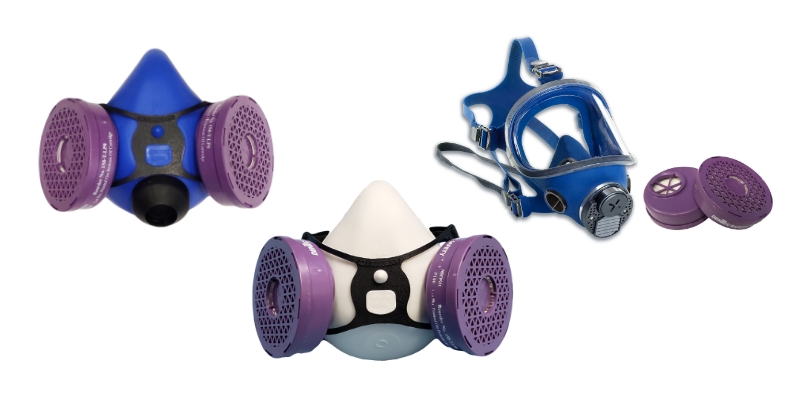
In its simplest terms, a P100 respirator is any respirator—whether it’s a half-mask, full-mask, or disposable—that uses a P100 filter to remove airborne particles. These respirators are commonly used in environments where exposure to hazardous airborne particles is high.
A P100 filter provides protection against a wide range of airborne contaminants, including:
- Asbestos
- Mold
- Silica
- Viruses
- Smoke
- Fumes
- And More
Are P100 Filters Good for Painting?
A P100 filter or cartridge on its own does not offer proper protection for painting. While P100 filters are highly effective at capturing particulate matter, they lack the carbon-based filter material needed to protect against paint fumes and vapors. Painting applications require a combination of a P100 filter with a carbon-based cartridge, such as those for organic vapors or acid gases, to ensure adequate protection.
- What is a P100 combination cartridge? A P100 combination cartridge is a type of filter that combines a P100 particulate filter with a charcoal-based cartridge such as organic vapor, acid gases, etc. The combination allows for comprehensive protection in applications where both particulate matter and additional contaminants are present.
Are P100 Filters Good for Welding?
P100 filters are excellent for certain types of welding, as they effectively protect against particulate matter generated during the process. This ensures that users are not exposed to harmful substances such as welding dusts and fumes.
How Long Do P100 Filters Last?
The lifespan of a P100 filter depends on the environment and frequency of use. Generally, P100 filters should be replaces when they become damaged, soiled, or when breathing becomes difficult. In clean environments, they can last several weeks, but in heavily contaminated environments, they may require more frequent replacement to maintain effective protection.
Can P100 Filters Be Reused?
Yes, in certain situations. Safe reuse of P100 filters is affected by the environment and application. Unless otherwise stated by the manufacturer, respirators with P100 filters can be reused until it is damaged, soiled, or causes increased breathing resistance. Regardless of the environment, the use of P100 filters should be limited, however, there is no way to accurately determine the maximum number of reuses.
Can P100 Filters Be Cleaned?
The cartridge casing of a P100 respirator can be cleaned, however, you must not attempt to clean the P100 filter itself because you will damage the filter material thereby reducing its effectiveness.
How do P100 Filters Compare Against Other Filters?
As mentioned, P100 filters are among the most effective respiratory protection filters available. Let’s see how P100 filters stack up against other popular filters.
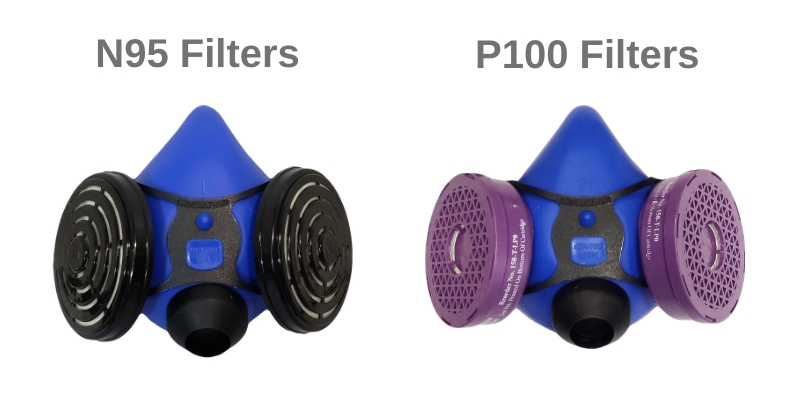
P100 vs N95 Filters:
- Filtration Efficiency: P100 filters offer a higher level of filtration efficiency compared to N95 filters. While N95 filters capture at least 95% of particles, P100 filters capture a minimum of 99.97%
- Oil Resistance: P100 filters are oil-resistant, whereas N95 filters are not.
- Application: P100 filters are suitable for environments with both oil and non-oil-based particulates. N95 filters are sufficient for non-oil-based particles only.
P100 vs N100 Filters:
- Filtration Efficiency: P100 and N100 filters are both high-efficiency particulate filters each offering 99.97% efficiency.
- Oil Resistance: P100 filters are oil-resistant, whereas N100 filters are not.
- Application: UseP100 filters in environments with oil aerosols and N100 filters in environments where oil aerosols are not a concern for the same level of particulate protection.
P100 vs P95 Filters:
- Filtration Efficiency: P100 and P95 filters are both designed to provide high levels of protection against oil and non-oil based particulate aerosols, with P100 filters offering a minimum 99.97% efficiency, whereas P95 filters offer a minimum of 95%.
- Oil Resistance: Both P100 and P95 filters are both oil-resistant.
- Application: P100 offers higher protection and is suitable for more hazardous environments, while P95 provides sufficient protection for less severe exposure.
Does Dentec Offer P100 Filters and Respirators?
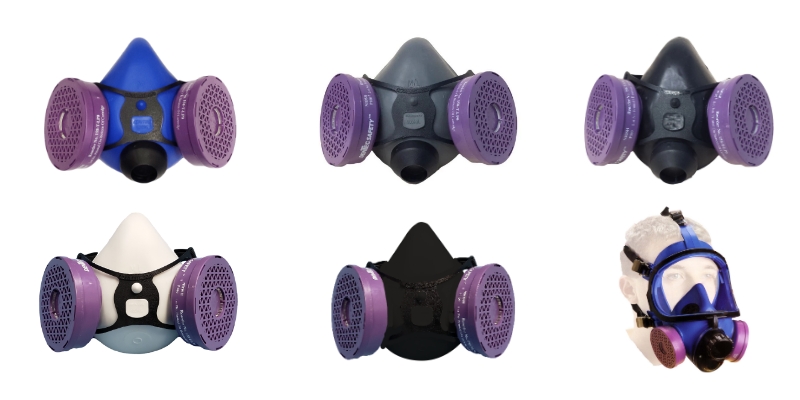
Absolutely. Our NIOSH-approved Comfort-Air® respirators are designed to deliver superior protection and comfort. We offer reusable respirators made from elastomeric, silicone, and thermoplastic rubber which come in different sizes that can be adjusted to fit any face. P100 filters can be mounted to any of our half or full-face masks. You can choose from a pancake style P100 filter or a traditional P100 cartridge to suit your application.
Does Dentec Offer P100 Filters and Respirators?
Absolutely. Our NIOSH-approved Comfort-Air® respirators are designed to deliver superior protection and comfort. We offer reusable respirators made from elastomeric, silicone, and thermoplastic rubber which come in different sizes that can be adjusted to fit any face. P100 filters can be mounted to any of our half or full-face masks. You can choose from a pancake style P100 filter or a traditional P100 cartridge to suit your application.
More P100 Questions?
We hope this post helped to answer any questions you may have about P100 filters. Did we miss anything? If you have any questions that we didn’t address here, please don’t hesitate to reach out to our team of Safety Specialists and we’ll be happy to help you out.
Once again, remember to choose the right filter for your specific needs, you must base your decision on the type of contaminants in your environment plus the level of exposure you or your team faces.
Dentec Safety is a leading manufacturer and distributor of safety products in the North America since 2004. Dentec Safety is dedicated to providing the highest quality safety products and solutions delivering enhanced value and comfort. Our expertise from decades of experience in Industrial Safety and our innovative design technologies have solidified us as thought leaders in the field. Protection and comfort are at the core of everything we do at Dentec. As a leading manufacturer of Safety Solutions, it is our mission to help organizations do the right thing, keep their employees safe and exceed Industry Health & Safety Standard.

